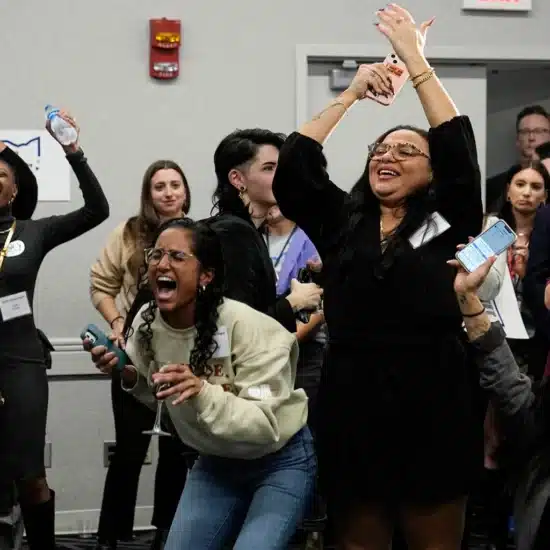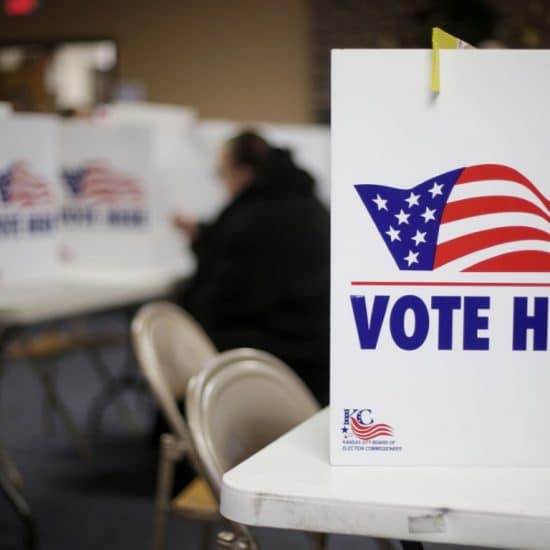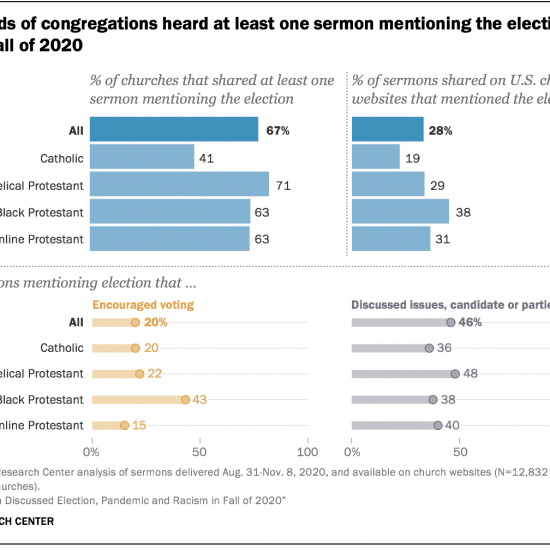(RNS) — Muslim women were elected to Congress for the first time. The number of non-religious elected officials expanded. And for the first time in memory an incumbent senator mentioned the upcoming Hindu holiday of Diwali in an acceptance speech.
Religion was not the story in yesterday’s midterm elections, but the national vote was not without some compelling — and telling — stories with implications for faith in American politics.
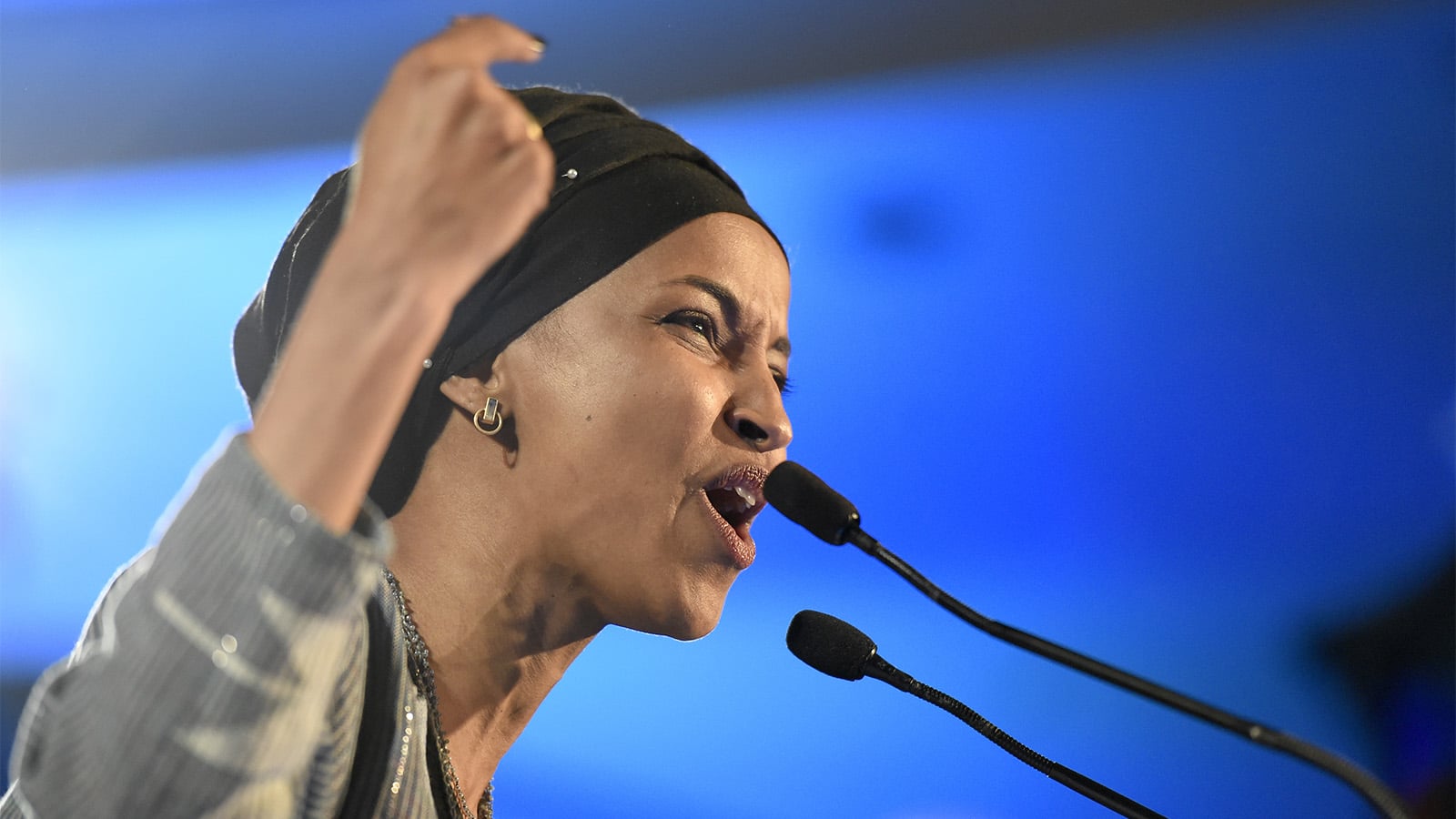 Democrat Ilhan Omar speaks after winning in Minnesota’s 5th Congressional District race during the election night event held by the Democratic Party on Nov. 6, 2018, in St. Paul, Minn. (AP Photo/Hannah Foslien)With the election of Democrat Rashida Tlaib from eastern Michigan and Ilhan Omar grabbing a seat in Minnesota, Muslim women broke a historic barrier last night. Omar’s seat was previously held by Keith Ellison, the first Muslim elected to Congress, who left the post earlier this year to run for Minnesota attorney general (he won that last night, too).
Democrat Ilhan Omar speaks after winning in Minnesota’s 5th Congressional District race during the election night event held by the Democratic Party on Nov. 6, 2018, in St. Paul, Minn. (AP Photo/Hannah Foslien)With the election of Democrat Rashida Tlaib from eastern Michigan and Ilhan Omar grabbing a seat in Minnesota, Muslim women broke a historic barrier last night. Omar’s seat was previously held by Keith Ellison, the first Muslim elected to Congress, who left the post earlier this year to run for Minnesota attorney general (he won that last night, too).
Along with Democratic Rep. André D. Carson, another Muslim who handily won re-election in Indiana, there are now three Muslim members of the House.
“It’s huge for our community especially when you think of the political climate in which they’ll come into office,” said Wardah Khalid, founder and president of the Poligon Education Fund, a nonpartisan organization dedicated to getting Muslims more engaged with Congress.
It was also a spectacular night for Jewish candidates.
Coming a little over a week after a shooting that killed 11 Jews in Pittsburgh’s Tree of Life synagogue, the election showed that despite a surge of anti-Semitism and white nationalism, American Jews were able to flex — and augment — their political muscle.
The midterms’ biggest upsets came at the hands of Jewish women.
Jacky Rosen, a Democrat, beat incumbent Dean Heller, a Republican, to win a U.S. Senate seat from Nevada. Rosen, who describes herself as “a former synagogue president,” now represents Nevada’s 3rd Congressional District.
In Michigan, Democrat Elissa Slotkin, a CIA analyst who served four tours in Iraq, beat out incumbent Mike Bishop, in a district that has been held by Republicans for nearly two decades.
And in Virginia, Democrat Elaine Luria unseated Republican Scott Taylor from his 2nd Congressional District post.
“It was really the night of the Jewish woman,” said Halie Soifer, executive director of the Jewish Democratic Council of America. “It was Jewish women who effectively flipped seats in red districts.”
In all, American Jews won 31 seats in Congress (four in the Senate and 27 in the House), according to the JDCA — the vast majority Democrats.
That will bring to 35 the number of American Jews in the 116th Congress, a gain of half a dozen seats over 2016. (Four Senate seats held by Jews were not up for election this year).
Considering that Jews make up only 2 percent of the U.S. population, they represent more than 6 percent of Congress.
Jews voted overwhelmingly for Democratic candidates. A national post-election survey of 1,139 Jewish voters conducted by GBA Strategies for J Street found that 76 percent voted for Democratic candidates, higher than in 2016.
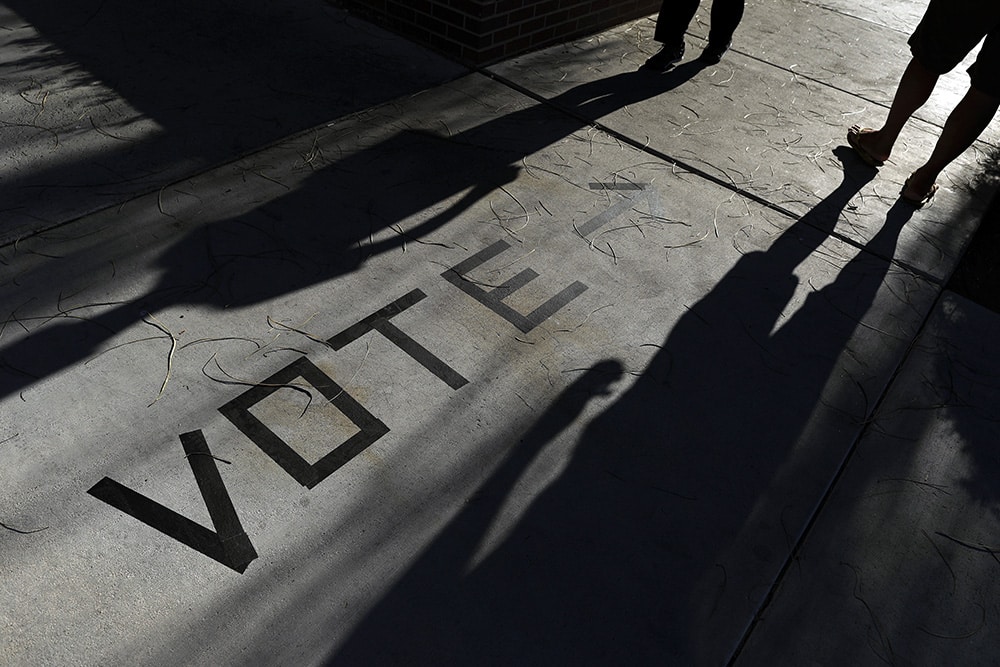 Voters head to the polls at the Enterprise Library on Nov. 6, 2018, in Las Vegas. (AP Photo/Joe Buglewicz)In part, that may reflect growing unease with rising anti-Semitism and right-wing extremism during the Trump presidency. The poll found that 72 percent of American Jews believe that Trump’s comments and policies are “very or somewhat” responsible for the Oct. 27 shooting at Tree of Life synagogue, considered the deadliest attack on American Jews in the history of the United States.
Voters head to the polls at the Enterprise Library on Nov. 6, 2018, in Las Vegas. (AP Photo/Joe Buglewicz)In part, that may reflect growing unease with rising anti-Semitism and right-wing extremism during the Trump presidency. The poll found that 72 percent of American Jews believe that Trump’s comments and policies are “very or somewhat” responsible for the Oct. 27 shooting at Tree of Life synagogue, considered the deadliest attack on American Jews in the history of the United States.
“American Jews are firmly in the Democratic, anti-Trump camp,” said pollster Jim Gerstein, who oversaw the survey. “In this election, the Jewish vote became even more Democratic.”
It’s worth noting, however, that though incumbent Democratic Rep. Dan Lipinski successfully fended off a challenge from Republican Holocaust denier and neo-Nazi Arthur Jones, Jones managed to accrue more than 53,000 votes in Illinois’ 3rd District — roughly 25 percent of the vote.
One American Jew who did not win was Michigan Republican Lena Epstein, a first-time candidate whose previous experience was helping run Trump’s successful 2016 campaign in Michigan. Epstein had invited a Messianic rabbi to offer a prayer in the aftermath of the Pittsburgh shooting, a gesture that most in the American Jewish community found insulting.
The question of Trump’s influence in the election was answered in part as white evangelical Protestants backed Republicans en masse, with exit polls reporting 75 percent cast their ballot for the GOP (22 percent said they voted Democratic). That’s roughly in line with margins from previous midterm elections, but a notable drop from the roughly 80 percent of white evangelicals who helped elect the president in 2016.
In the same exit polls, Catholics as a whole appear to have flipped in favor of Democrats this election, with 50 percent backing the resurgent party and 49 percent backing the GOP. That’s a notable shift from 2014, when only 45 percent backed Democrats and 54 percent supported Republicans, according to Pew.
The night was mixed for those who don’t believe at all. Hemant Mehta, author of the Friendly Atheist blog, tracked results for candidates who say they are atheist, agnostic, religiously unaffiliated, “spiritual but not religious” or members of the Congressional Freethought Caucus. According to his tallies, all incumbent U.S. House candidates in the category — all Democrats — held onto their seats, but all challengers lost. Meanwhile, eight “openly non-religious” candidates won seats in state assemblies for the first time last night, bringing the total nationwide to 38.
Conservative religious voters in some parts of the country came away largely pleased, as Alabamans overwhelmingly backed an amendment to the state’s Constitution authorizing public displays of the Ten Commandments, with roughly 7 in 10 voters lending their support to the measure at the polls.
Three states — Alabama, West Virginia and Oregon — voted on abortion-related ballot initiatives. Voters in Alabama and West Virginia approved altering their state constitutions to, among other things, declare they do not protect the right to an abortion or require funding of abortions. The Oregon initiative, which would have barred federally funded health care programs from funding abortions, failed.
But in Kentucky, Kim Davis, the county clerk who made national news in 2015 for refusing to grant same-sex couples marriage licenses despite a U.S. Supreme Court decision declaring it legal, lost her re-election bid. Davis, a member of the Apostolic Church who said she opposed same-sex marriage because of Christian beliefs, became a symbol for opponents of marriage equality. She even met Pope Francis during his 2015 visit to the United States, sparking controversy.
On the whole, the election brought more different types of candidates into the midterm races and produced a Congress that is, in the words of CNN analyst Van Jones, “younger, browner and cooler” than any before. In addition, Democratic Sen. Tim Kaine of Virginia gave voice to minority religions as he spoke to campaign workers after cruising to an easy victory, as most analysts expected.
What they didn’t expect was for him to focus part of his victory speech on Diwali, a Hindu festival of lights that begins on Wednesday. Kaine compared the festival to the election: “Diwali is the celebration of good over evil, the celebration of light over darkness, the celebration of understanding over ignorance. That’s what today is. That’s what we’re starting today.”

